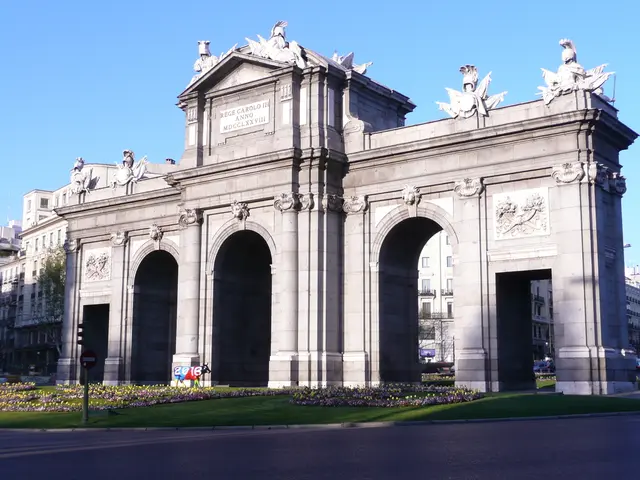Budget Showdown: Trump's 2026 Budget Proposal Unleashed
Trump's 2026 Budget to be Unveiled at White House – First Since His Recent Return to Office Power
Hey there! The Trump administration is set to reveal their much-anticipated 2026 budget plan on Friday. Here's what you need to know about this so-called "Roadmap to Priorities".
This budget proposal, the first since Trump's re-election, will reportedly advocate for significant cuts across several federal programs, bringing us closer to understanding the President's second-term objectives. Russell Vought, the head of the White House's Office of Management and Budget and a key player in Project 2025, confirmed the forthcoming release.
The nation's combined federal budget, currently standing at around $7 trillion, has been on an upward trajectory, with deficits nearing $2 trillion and annual interest on the debt touching $1 trillion. The COVID-19 pandemic emergency spending, changes in the tax code, and escalating costs related to Medicare, Medicaid, and other programs have been key contributors to this inflation. The burgeoning national debt, now at a staggering $36 trillion, is set to grow further.
With these troubling figures in mind, the proposed budget aims to drastically reduce spending. Some of these cuts, like those made by Trump's actions and the Department of Government Efficiency, led by Elon Musk, are already in effect. The budget may also suggest new revenue streams, possibly through Trump's tariffs program.
The plans are sure to face harsh criticism from Democrats, who see it as an attempt to dismantle crucial government programs that the American public relies on. The showdown comes as Congress is concurrently working on Trump's major spending and tax legislation package. House Speaker Mike Johnson is pushing to have this bill, affectionately dubbed the "big, beautiful bill," approved by the House and sent to the Senate by Memorial Day.
As Congress continues to navigate these complex financial waters, Cabinet officials will soon begin their Capitol Hill testimonies to defend their requests in the President's budget. Remember, it's Congress that holds the constitutional power to decide spending plans, authorize federal programs, and fund them through the appropriations process. Previous attempts to streamline funding have led to breakdowns, often forcing lawmakers to pass stopgap bills to prevent government shutdowns.
Stay tuned for more updates as the White House's budget blueprint unfolds and the battle lines are drawn. In the weeks ahead, Vought will head to Capitol Hill to strengthen the Trump administration's case for these proposed budget changes.
Inside Scoop:
- The Housing Choice Voucher (HCV) Program faces possible cuts, with proposals to block grant the HCV program, potentially impacting the number of assisted households and prompting changes such as work requirements and minimum rent increases for HUD-assisted households.
- A $9.3 billion rescissions package could be on the table, targeting agencies like the State Department, USAID, NPR, and PBS, as well as HUD's affordable housing and homelessness assistance programs.
- While specific new revenue proposals remain unmentioned, the recent tax cuts suggest that an economic growth strategy or offsetting spending cuts may be under consideration to bridge the funding gap.
- The Trump administration will release their 2026 budget plan on Friday, a proposal that reportedly advocates for significant cuts across federal programs and is part of President Trump's second-term objectives.
- The budget may suggest new revenue streams, possibly through Trump's tariffs program, aiming to drastically reduce spending and counteract the nation's combined federal budget inflation.
- The proposed budget cuts, such as those made by Trump's actions and the Department of Government Efficiency, led by Elon Musk, are already in effect, but are likely to face harsh criticism from Democrats.
- The Housing Choice Voucher (HCV) Program faces possible cuts, with proposals to block grant the HCV program potentially impacting the number of assisted households and prompting changes such as work requirements and minimum rent increases for HUD-assisted households.
- A $9.3 billion rescissions package could be on the table, targeting agencies like the State Department, USAID, NPR, PBS, and HUD's affordable housing and homelessness assistance programs.
- As Congress continues to navigate these financial waters, Cabinet officials will testify on Capitol Hill to defend their requests in the President's budget, with previous attempts to streamline funding often leading to breakdowns and necessitating stopgap bills to prevent government shutdowns.







